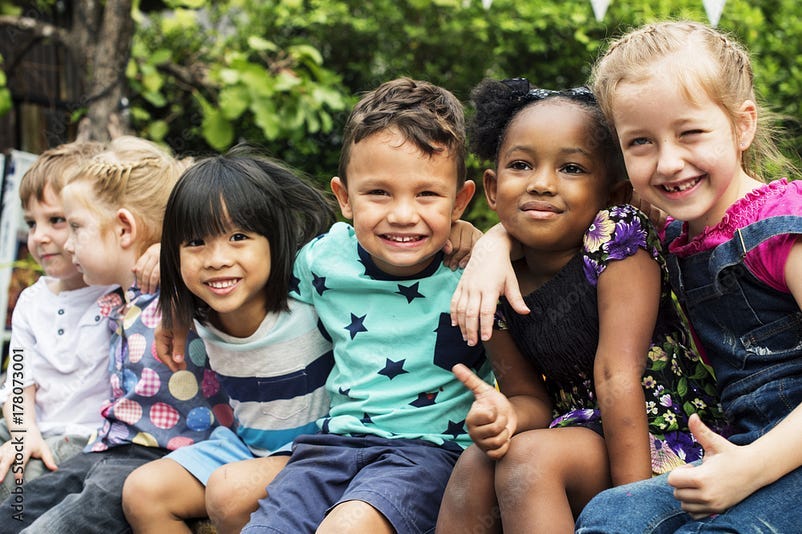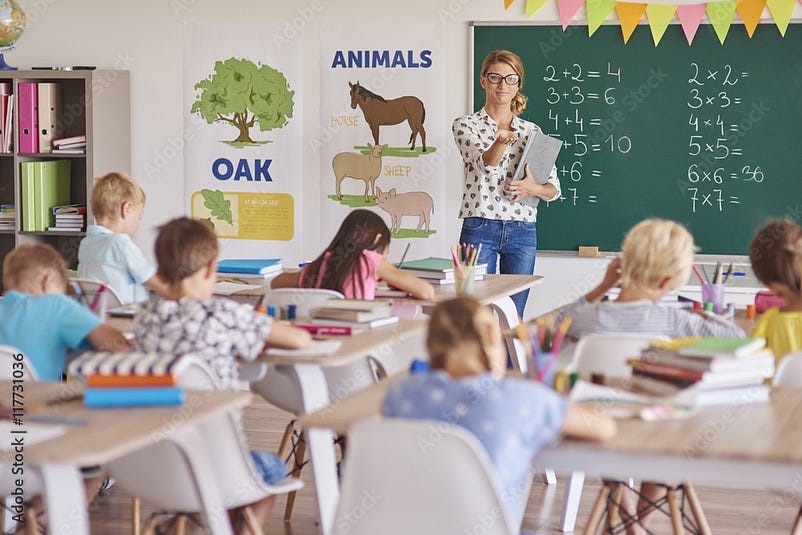Why It's Hard to Find the “Right School” for Your Gifted Child
Most pre-school and elementary schools aren't ready for your gifted child's needs.
In this post, we look at one common reason behind why gifted children have fairly universal, inevitable problems in the typical kindergarten through 8th grade school setting. In this short post, we consider how most schools are set up and designed.
In almost all cases, schools group and educate children by age rather than ability or level of performance, and this practice makes school time go too slowly and repetitively for bright, gifted children. A clear side-effect is they don’t get to learn nearly as much as they could have been learning from an environment that is a better fit for them. It can also affect the gifted child’s happiness, excitement, behavior, and cooperation.
According to David Lohman (1999)[i], co-author of both the Cognitive Abilities Test and the Iowa Test of Basic Skills, the achievement range — what students can do, such as reading or math — within a typical public school’s same-aged, mainstreamed (mixed ability) 1st grade classroom (average age 7) is already 12 grade equivalencies!
Age alone is a convenient, yet inefficient, way to group learners. It should be fairly clear that grouping kids by age alone for instruction makes about as much pedagogical sense as grouping them by height.
The “average” intellectual and achievement range is indeed that which comprises the most people.
If there are 25 students in the class, for example, only three or four will be part of the lower learners’ end and another three to four will be in the faster learners’ end of the classroom’s range. Average learners who receive material that is new to them require 7 to 8 repetitions to learn it. The slower learners need more repetitions of material to catch on and learn it. The gifted — or faster — learners need fewer repetitions to learn it. This is because it is common for gifted learners to simply absorb more around them in all their life’s settings than most people, so they arrive not only ahead for school subjects but for many other topics and experiences. Even if the material hasn’t been introduced before, the gifted thinker may have enough experiential background to only need one or two additional repetitions — if any — to master it.
And, because we tend to form friendships with people who are like us — children with similar learning levels often find the same things funny or interesting — the children at both the lower and higher ends of the ability spectrum are quite likely to feel very lonely in such a system.
But this system affects more than just peer relationships, friendship formations, and social-emotional experiences, it also means that some children who are initially the slow learners (and often qualify for special education support) arrive at school not yet having the simplest reading or number awareness and skills. So, what the gifted child might already know and get to practice in a nurturing environment at home or preschool by the time they are 2 to 3 to 4 years old, the slower learners [ii] might not reach that point until 2nd, 3rd or 4th grade.
Some profoundly gifted children (Level Five) can read with great fluency and comprehension at a nearly adult level by the time they are 5 or 6 years old.
Basic Level One, “normal gifted” I like to say, bright children, have usually already absorbed pre-reading skills before they start school and are reading quite well no later than 2nd grade.
Teachers teach to the top of the bottom third of the students in their classrooms. Since most students already pass proficiency tests — or are close to doing so — before they enter the grade, it is only the bottom third of the students that the teacher generally addresses and plans for when designing continued learning. The following conversation illustrates what I mean:
I spoke to a second grade teacher who was awarded “Teacher of the Year” for her upper middle class public school district full of well-educated parents with high performing children. By most standards, she is truly a master teacher. She was part of a team that developed a reading assessment designed for children in grades one to three and now she now trains other teachers how to use it.
When I asked her if the lengthy, detailed evaluation went past the third grade level for those children whose reading achievement level was higher than that, she said no; there was no need for that.
I then asked how many of her students each year hit the top of the assessment and could read with full comprehension to the end of the third grade level by early in their second grade year. She said that about a third of her students could read that well.
I probed further: “Would those students be instructed at a higher level now that they had mastered reading nearly two years above grade level?”
She said, no, they’d all be just fine, and that this just gave her more time to work with those children who were most “at risk” for not learning to grade level. She added that although young children may be able to read well, and beyond grade level, they couldn’t possibly actually grasp high-level material because they still didn’t have enough “life experience.” In her opinion, it was far more important that advanced children gain appropriate life experiences with age mates than for them to move forward academically.
Ugh.
I tried to point out that some children actually can read with high levels of comprehension when that young. I got nowhere on that one. I pointed out that some children would become restless and misbehave if they were made to do repetitive lessons when they already completely grasped the material. She went back to her viewpoint that social-emotional learning was still taking place, and they needed to learn how to get along with others and be patient, understanding, and so forth. My viewpoint is that social-emotional learning is important, but not necessarily in reading or math classes where a gifted child is an outlier for grade-level material.
It’s the same with numerical ability. Some children seem to be born with a sense of how to create the rubrics needed to solve numerical problems. Again, among the gifted, there is a range even among them, but generally all of them are at least past their average classmate in academic understanding by the time they start kindergarten! So, yes, Lohman’s observation is supported by what’s going on in our schools, especially the early grades.
In other posts, I delve into some history and the practice of ability grouping, tracking, grade skipping and retention. All of these have been common — and effective and useful — in the past and none of them is much in use now (not since the late 1970s in most cases). I discuss Gifted Programs in other posts and books, as well. They—gifted programs—vary considerably from one place to another and in the types that they are.
In the meantime, keep this in mind: the best place to be is not at the top of the class but at the top of the middle third. That place is different in each school, and I address that, too, in posts that mention “the relativity of giftedness.” Your child is most likely a chip off the parental block as far as intelligence level. If you feel comfortable when you are walking around the school, meeting other parents and watching your child interact with the other students in the same grade, you will likely have the “right” school for learning something new most days and for finding people who might become friends.
Some children are more flexible and able to conform to school expectations whether the parental and educator expectations fit them well or not, and posts that discuss personality types in gifted children can be very helpful in knowing which child benefits from something different than the school set-up had in mind. Just be aware that schools are not set up for every learner no matter what they try to tell you.
[i] Lohman, D. F. (1999). Minding our p’s and q’s: On finding relationships between learning and intelligence. In P. L. Ackerman, P. C. Kyllonen, & R. D. Roberts (Eds.), Learning and individual differences: Process, trait, and content determinants (pp. 55–76. Washington, DC: American Psychological Association.
[ii] I say “initially” because some children aren’t actually slow learners as much as they haven’t yet been introduced to the support and nurturance some more fortunate children have had. Being behind isn’t the same as proof that they will always be slow learners. They may just be “behind” learners.
My current published and coming books about the gifted:
The Five Levels of Gifted Children Grown Up: What They Tell Us (2023). https://www.amazon.com/Levels-Gifted-Children-Grown-Up/dp/B0C9SHFRLH or https://www.barnesandnoble.com/w/the-5-levels-of-gifted-children-grown-up-phd-deborah-l-ruf/1143719859?ean=9798988323709. This is an 18 year longitudinal study follow-up about the original gifted child subjects in 5 Levels of Gifted: School Issues and Educational Options (2005, 2009).
Keys to Successfully Parenting the Gifted Child (2023). Keys to Successfully Parenting Gifted Children (2022, 2023)
Losing Our Minds: Too Many Gifted Children Left Behind (Oct. 2024). Available for pre-order now. Follow this link: https://www.amazon.com/dp/B0DHV6QT6F
5 Levels of Gifted: School Issues and Educational Options in 2009. Here are links to the 5 Levels of Gifted book on Barnes & Noble: https://www.barnesandnoble.com/w/5-levels-of-gifted-deborah-ruf/1126358834 and Amazon: https://www.amazon.com/Levels-Gifted-School-Educational-Options/dp/0910707987 or directly from the publisher: https://www.giftedunlimitedllc.com/store/p12/5_Levels_of_Gifted.html
Environmental, Familial, and Personal Factors That Affect the Self-Actualization of Highly Gifted Adults: Case Studies (D. Ruf, 1998) doctoral dissertation. Free PDF https://dabrowskicenter.org/ruf
Dr. Ruf is available for the following services.
Click for details and to schedule:
One-Hour Test Interpretation
Gifted Child Test Interpretation & Guidance
20-Minute Consultation
45-Minute Consultation
One-Hour Consultation
Podcast Interview





As a polymathic mom, raising a 2E mini-me, I did not even attempt to put her into a school. Gifted schools are for Tiger Moms/Dads/Parents/Caregivers. I hated school Pre-K through High school. Every moment of it. Every aspect of it. My saving grace was that my high school teachers recognized what I was/am. I would show up and hand in the necessary items or take their tests in the space of 2-3 minutes and then ask to go to the "library" (then I would promptly leave the school grounds altogether). They knew what I was doing. They let me, without saying it aloud.
I home school this 8 yr. old of mine. She has ADHD in a way that is not my "everything, everywhere, all at once but not ADHD". I mashed together all of the good parts of a multitude of pedagogy styles and now I am draping them with the powerful heart of Keiran Egan methods that have been altered/improved by Brandon Hendrickson. Weaponizing ADHD for her. Most gifted children do not belong in the schools offered in the USA (I have not researched other countries in any kind of depth). John Gotto had so many true things to say about schools and those things apply to mainstream and supposed gifted schools, alike. I seem rather adamant about the entire things.
These are my own feelings and thoughts on the matter. These are the steps I have taken so that my child has a full and fulfilling childhood. The brick and mortar is already leaking away from universities across the planet. It will continue to do so, all the way down to elementary schools. This is already in process. My great grandchildren, should I have any, will not recognize the educational landscape that stands today. It's hard to find the "Right School" because it is the "Wrong Place", in the first place.